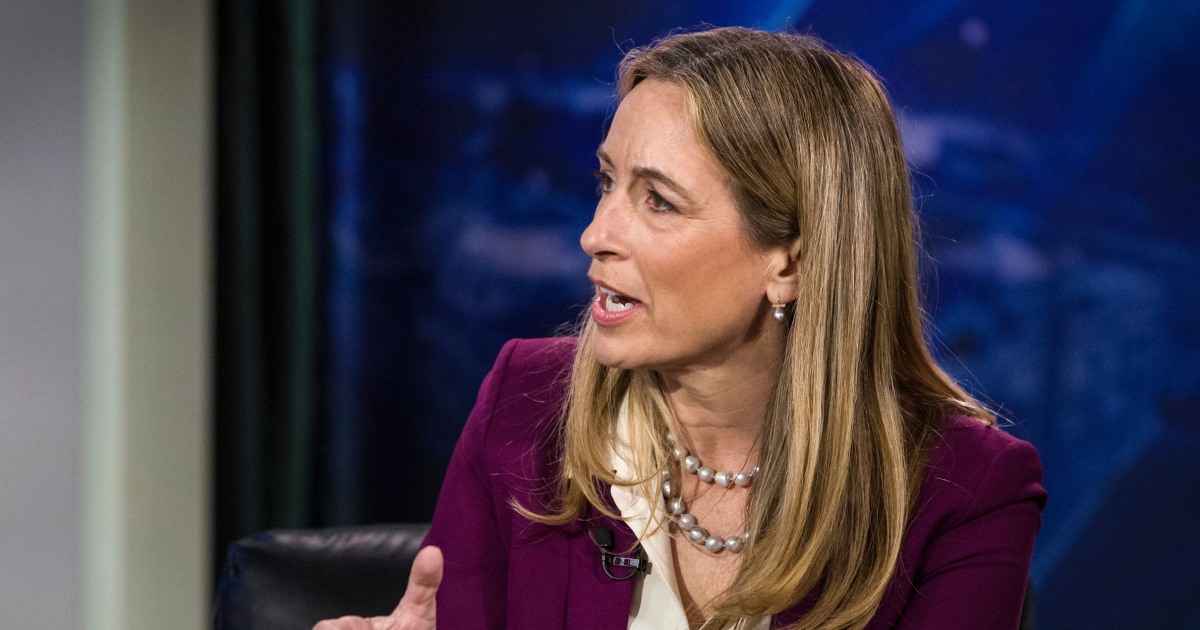
New Jersey Democrats’ primary for governor is coming down to the final month. And while the race is still hotly contested, some candidates are signaling that they view Rep. Mikie Sherrill as the one to beat.
Five of the six Democratic contenders will face off in a two-and-a-half-hour debate on Sunday, following a heated encounter earlier this week that offered a preview of the attacks that could be coming at Sherrill. Both Jersey City Mayor Steve Fulop and Newark Mayor Ras Baraka aimed barbs at the congresswoman and cast her as inexperienced and moderate, implying that they view her as an obstacle.
But the race remains very fluid. Limited public polling has shown Sherrill leading the pack, with the candidates largely clustered together and within the surveys’ margins of error.
“It is the most unsettled race in the 30 years that I’ve been working in New Jersey,” said Democratic strategist Julie Roginsky.
The race is difficult to gauge because such a hotly contested primary is unusual in the state, where party bosses have wielded their power to anoint their preferred candidates. But the county parties lost the ability to give their preferred candidates advantageous positions on primary ballots when the state changed its ballot design last year, following a lawsuit from now-Sen. Andy Kim, D-N.J.
“It is extremely unpredictable,” said Fulop, one of the top contenders, who later added, “We’ve never been here before.”
Why eyes are on Sherrill
The county parties could still impact the race, leveraging their turnout operations to boost their endorsed candidates. While Fulop and Rep. Josh Gottheimer did not seek most county endorsements, Sherrill racked up support from the most counties, including key Democratic strongholds like Essex and Middlesex.
“She’s the machine candidate and perceived as the front-runner,” Fulop told NBC News. “I don’t think that’s a secret.”
Sherrill campaign spokesperson Sean Higgins said Fulop’s characterization of the congresswoman as the political machine’s candidate was “remarkably lazy and inaccurate.”
“If you look at her track record of running races, her campaign in 2018 was harnessing and leading a wave of grassroots enthusiasm,” Higgins said in a statement, referencing Sherrill’s first run for political office when she won her House seat.
During their Monday debate, hosted by NJ Spotlight News, NJ PBS and WNYC, both Fulop and Baraka targeted Sherrill, accusing her of issuing vague “platitudes” and of being too moderate.
Fulop said he targeted Sherrill on Monday because he did not feel she had been adequately scrutinized, particularly as the perceived front-runner.
According to video of a news conference provided by Baraka’s campaign, the Newark mayor told reporters after Monday’s debate, “I don’t agree that she’s a progressive. I think her record shows that clearly.” Baraka also clashed with Gottheimer during the debate, who the mayor cast as too conservative.
Sherrill, for her part, said during Monday’s debate that she has pushed back on leaders of both parties, noting that she pushed for Trump’s first impeachment and would take on Trump as governor.
“In New Jersey, [it is] making sure that we are taking him to court, pushing back against these Medicaid cuts, clawing back federal funding back to New Jersey,” she said.
State Sen. John McKeon, a Sherrill supporter, suggested that attacks on Sherrill’s lack of executive experience were “people looking for soundbites.”
“It doesn’t stick,” McKeon said, pointing to her experience as a Navy pilot and prosecutor as proof that she can lead the state government. “Trenton’s not an easy place to navigate, but compared to what she’s done in her life, I think it will be a piece of cake.”
McKeon said he welcomed any attacks on her in Sunday’s debate, noting, “She’s at her best when she’s challenged.”
Sprint to the finish
Although some Democrats view Sherrill as the top candidate in the race, it’s all relative. The Democratic primary polls have shown relatively little separation between the contenders, especially compared to repeat candidate Jack Ciatterelli’s advantage in the GOP primary. The Democratic race is still wide open, with a crowded field and millions of dollars blanketing the Garden State airwaves with ads ahead of the June 10 primary.
“Every one of them has a pathway to win,” said Roginsky, the Democratic strategist.
Sherrill’s campaign has focused on expanding her appeal to a broad coalition of voters from her House district to a statewide campaign, and she could leverage her position as the only woman in the primary. She has stressed her background and her record flipping a Republican district in 2018 and cast herself as the candidate best equipped to take on Trump.
“Voters really want someone who can beat a Republican in November,” said Higgins, the Sherrill campaign spokesperson.
“If people are looking for a winner, and we know they are, I think they’ll land at the logical choice, the person who’s actually done that. And that’s Mikie,” Higgins later added.
Fulop, who described his typical supporter as a “pragmatic progressive,” said the party should reject establishment candidates to win in November and shouldn’t be afraid to criticize Democratic Gov. Phil Murphy, who cannot run for re-election due to term limits.
While Democrats may want to make the race about President Donald Trump, Fulop predicted the eventual GOP nominee will make it a referendum on Murphy. He suggested the governor has not adequately combatted the state’s high cost of living, transportation woes and culture of political corruption.
”The reality is that if you are, again, the establishment candidate that is defending Phil Murphy and you think you’re going to get to the general election and talk about Trump and you’re gonna win, you’re gonna get blown out,” said Fulop, noting that Trump made gains in New Jersey last November. He lost the state by 6 points, a 10-point improvement from his margin in 2020.
Fulop and Baraka have both made appeals to the party’s progressive voters, and Baraka may get a boost among voters who want the party to fight Trump following his arrest last week at a federal immigration detention facility.
Gottheimer, meanwhile, could run up the middle as more of a moderate candidate who has focused his messaging on affordability and lowering taxes. He has also pitched himself as a candidate with crossover appeal, defeating a Republican congressman in 2016 even as Trump narrowly carried his district.
“While the same old status quo candidates in this race take shots at each other, Josh is focused on the two biggest fights facing Jersey: fighting Donald Trump and fighting to get our costs and taxes down,” said Gottheimer campaign spokesperson Peter Optiz. “Josh is the only candidate with a plan to cut taxes and a record of getting tough things done—that’s what he’ll do for Jersey families as Governor.”
Former state Senate President Steve Sweeney, who has leaned on his experience in state government and lagged behind the other candidates in some public polls, could have a path as the only candidate from South Jersey, with support from some key county parties with strong turnout operations.
“Steve is kind of the person that represents that steady hand at the wheel that I think a lot of people in New Jersey would like to see, especially with so much chaos in Washington,” said Sweeney spokesperson Kerry Lyons.
A sixth candidate, former Montclair Mayor Sean Spiller, did not meet the fundraising threshold that would have qualified him to accept public campaign funds and participate in the debates. But Spiller, the former head of the state’s teacher’s union, has benefitted from more than $8 million in ads from Working New Jersey, a super PAC tied to the New Jersey Education Association, and he could get a boost from the state’s educators.
Gottheimer and super PACs supporting his campaign have spent $19.4 million combined on ads so far this year, followed by Fulop and his aligned super PAC, which have spent $15 million combined, according to ad-tracking firm AdImpact. Sherrill and her aligned super PAC have spent significantly less so far, $2.9 million. Baraka and his super PAC have spent $2.7 million, and Sweeney and his super PAC have spent $2.5 million
Sherrill’s lower spending so far was a strategic decision by the campaign, which opted to hold its money until the final weeks, when it believed voters would be tuning into the race.
Fundraising reports filed earlier this week showed Sherrill’s campaign had $4.7 million in its account as of May 9, more than twice as much as the next-closest candidate. From Friday through the June 10 primary, Sherrill has reserved the most airtime of any candidate so far, nearly $1.8 million. Her allied super PAC, One Giant Leap PAC, has reserved $922,000.
Even with the millions of dollars already spent, candidates have mostly stuck to positive messaging — though Sweeney did launch a TV ad last month that knocked “weak” Democrats and showed images of Sherrill, Gottheimer and Senate Minority Leader Chuck Schumer, D-N.Y., without mentioning them by name.
It remains to be seen exactly how, when or even if the attacks will ramp up. But each of the candidates is looking for a way to break away from the pack with just a few weeks to go.
